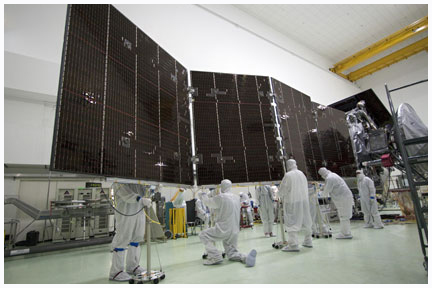Spring Manufacturing for NASA's "Juno" Mission
- Originally published by Newcomb Spring
Newcomb Spring's Precision Springs Provide Critical Functions on Spacecraft
Alpharetta, GA-based Newcomb Spring Corp. today announced the Company has supplied springs to NASA contractor Lockheed Martin Space Systems, Denver, CO, to perform a number of critical functions on the NASA "Juno" mission to explore the planet Jupiter. Newcomb assisted Lockheed Martin in the design of springs for the craft, to help determine necessary tolerances, and supplied springs to the mission that perform functions including opening the doors to the solar panels that provide power to the unit once it is deployed, as well as other functions including keeping doors latched and deploying the arms of the craft when it is in orbit. Lockheed Martin is the primary spacecraft contractor and was responsible for the design, build, and test of the craft.

"We are proud to be a part of the Juno space mission, and to have provided necessary parts to Lockheed Martin, a distinguished supplier to NASA," said Robert Jacobson, President of Newcomb Spring. "While the deployment of this spacecraft required an immense effort in which Newcomb played a small role, the effectiveness of our springs is still critical to the mission."
"Solar power arrays are the only way to provide power to a spacecraft that will be in space for extended periods, as the Juno mission will be, so without power from the solar panels, the spacecraft cannot perform any of its necessary tasks," said Robert Herrmann, General Manager of Newcomb Spring of Colorado. "Given the importance and duration of this mission, we were pleased to be able to meet Lockheed Martin's, and NASA's needs."
"The Juno spacecraft launched on Friday, August 5, 2011," said a mechanical designer with Lockheed Martin. "We can confirm solar array deployment, which required successful function of 60 springs produced by Newcomb. I want to thank Newcomb for their assistance with the hardware used in this successful design."
The Juno Mission, part of NASA's New Frontiers Program, launched on August 5, 2011, aboard a United Launch Alliance Atlas V rocket, from Cape Canaveral, FL to begin its 5-year trek to Jupiter. The Juno mission's stated goal is to place a solar-powered spacecraft in orbit around the planet, to gain a better understanding of our solar system's beginnings by understanding the beginnings of Jupiter. Scientists intend to "investigate the existence of an ice core, determine the amount of global water and ammonia present in the atmosphere, investigate the origin of the Jovian magnetic field, and explore the polar magnetosphere."
